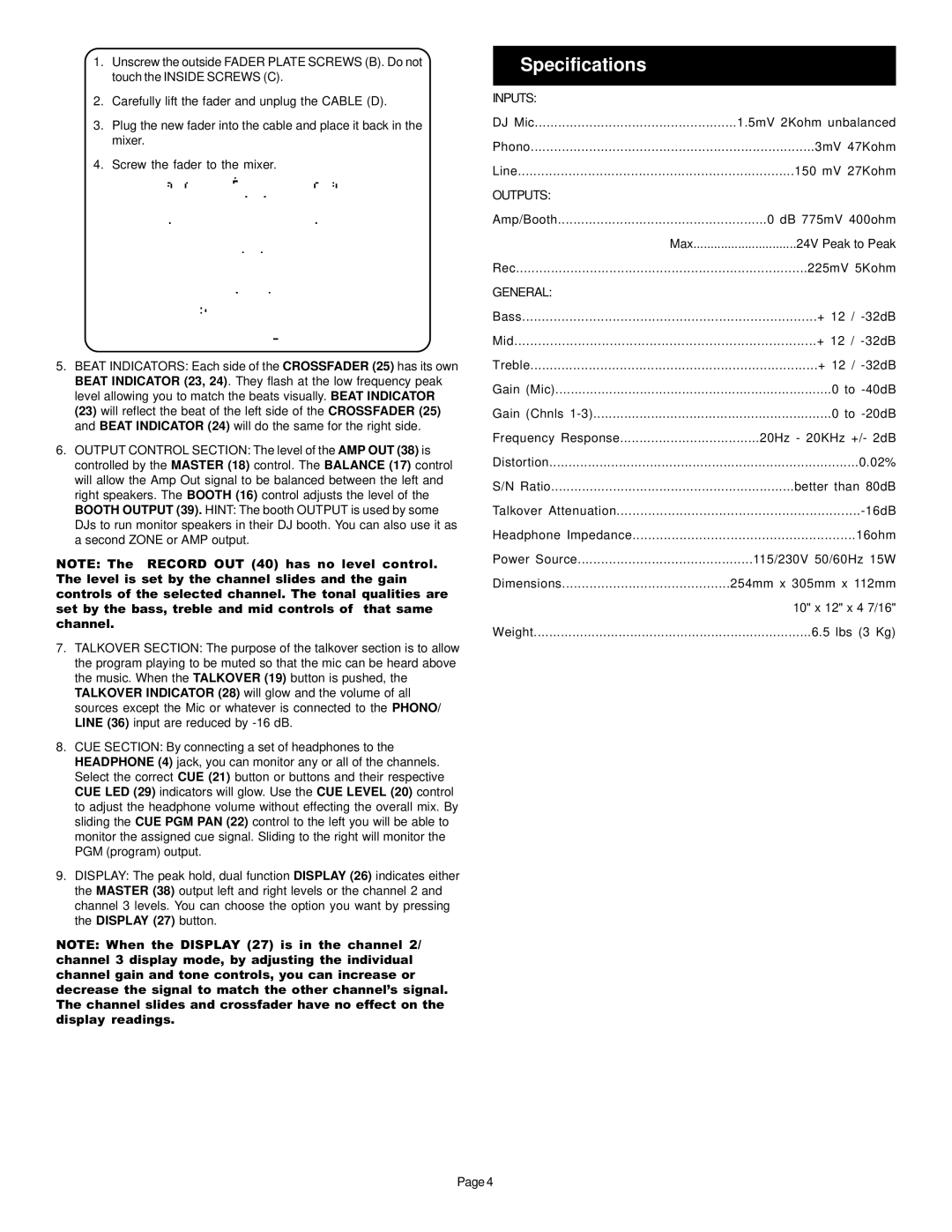
1.Unscrew the outside FADER PLATE SCREWS (B). Do not touch the INSIDE SCREWS (C).
2.Carefully lift the fader and unplug the CABLE (D).
3.Plug the new fader into the cable and place it back in the mixer.
4.Screw the fader to the mixer.
5.BEAT INDICATORS: Each side of the CROSSFADER (25) has its own BEAT INDICATOR (23, 24). They flash at the low frequency peak level allowing you to match the beats visually. BEAT INDICATOR
(23)will reflect the beat of the left side of the CROSSFADER (25) and BEAT INDICATOR (24) will do the same for the right side.
6.OUTPUT CONTROL SECTION: The level of the AMP OUT (38) is controlled by the MASTER (18) control. The BALANCE (17) control will allow the Amp Out signal to be balanced between the left and right speakers. The BOOTH (16) control adjusts the level of the BOOTH OUTPUT (39). HINT: The booth OUTPUT is used by some DJs to run monitor speakers in their DJ booth. You can also use it as a second ZONE or AMP output.
NOTE: The RECORD OUT (40) has no level control. The level is set by the channel slides and the gain controls of the selected channel. The tonal qualities are set by the bass, treble and mid controls of that same channel.
7.TALKOVER SECTION: The purpose of the talkover section is to allow the program playing to be muted so that the mic can be heard above the music. When the TALKOVER (19) button is pushed, the TALKOVER INDICATOR (28) will glow and the volume of all sources except the Mic or whatever is connected to the PHONO/ LINE (36) input are reduced by
8.CUE SECTION: By connecting a set of headphones to the HEADPHONE (4) jack, you can monitor any or all of the channels. Select the correct CUE (21) button or buttons and their respective CUE LED (29) indicators will glow. Use the CUE LEVEL (20) control to adjust the headphone volume without effecting the overall mix. By sliding the CUE PGM PAN (22) control to the left you will be able to monitor the assigned cue signal. Sliding to the right will monitor the PGM (program) output.
9.DISPLAY: The peak hold, dual function DISPLAY (26) indicates either the MASTER (38) output left and right levels or the channel 2 and channel 3 levels. You can choose the option you want by pressing the DISPLAY (27) button.
NOTE: When the DISPLAY (27) is in the channel 2/ channel 3 display mode, by adjusting the individual channel gain and tone controls, you can increase or decrease the signal to match the other channel’s signal. The channel slides and crossfader have no effect on the display readings.
Specifications
INPUTS: |
|
DJ Mic | 1.5mV 2Kohm unbalanced |
Phono | 3mV 47Kohm |
Line | 150 mV 27Kohm |
OUTPUTS: |
|
Amp/Booth | 0 dB 775mV 400ohm |
Max | 24V Peak to Peak |
Rec | 225mV 5Kohm |
GENERAL: |
|
Bass | + 12 / |
Mid | + 12 / |
Treble | + 12 / |
Gain (Mic) | 0 to |
Gain (Chnls | 0 to |
Frequency Response | 20Hz - 20KHz +/- 2dB |
Distortion | 0.02% |
S/N Ratio | better than 80dB |
Talkover Attenuation | |
Headphone Impedance | 16ohm |
Power Source | 115/230V 50/60Hz 15W |
Dimensions | 254mm x 305mm x 112mm |
| 10" x 12" x 4 7/16" |
Weight | 6.5 lbs (3 Kg) |
Page 4
